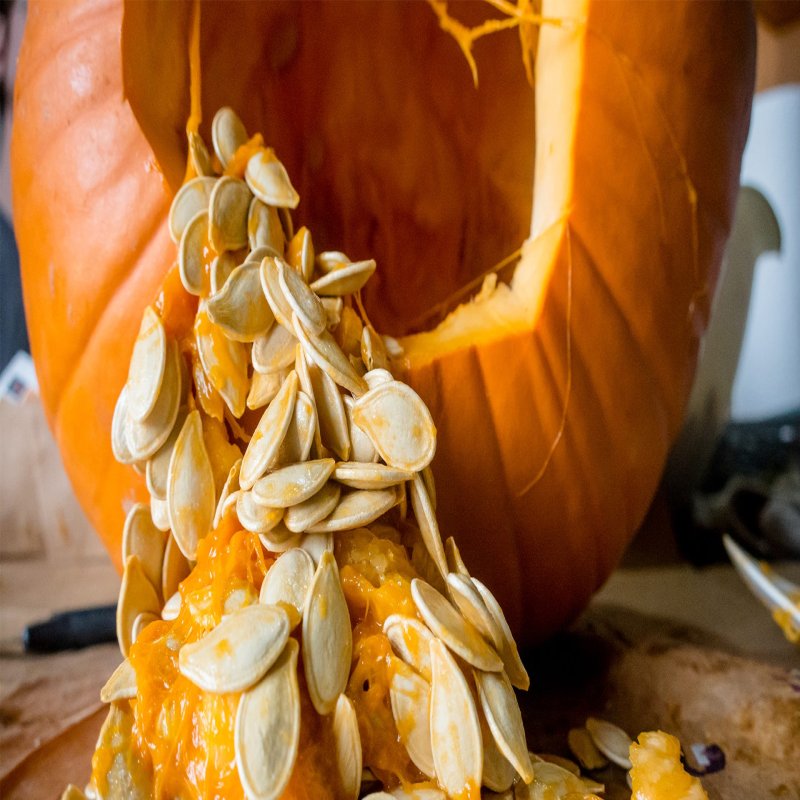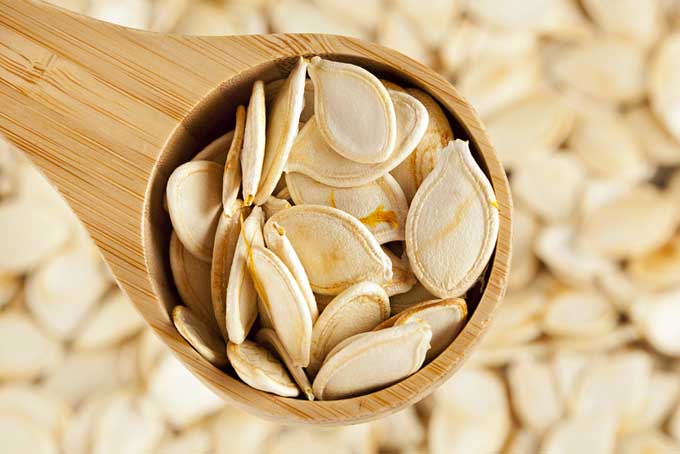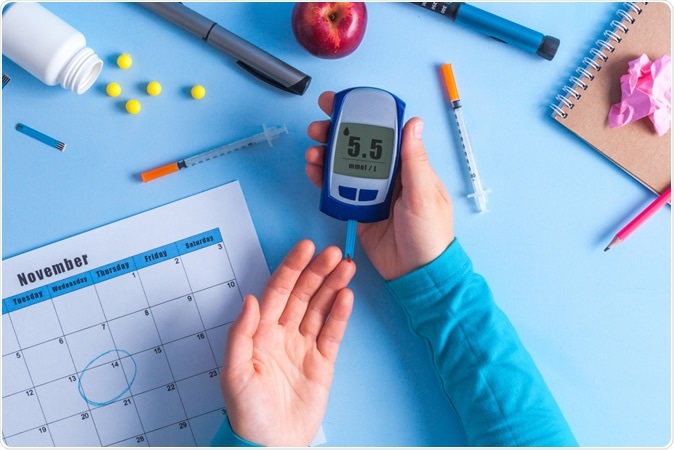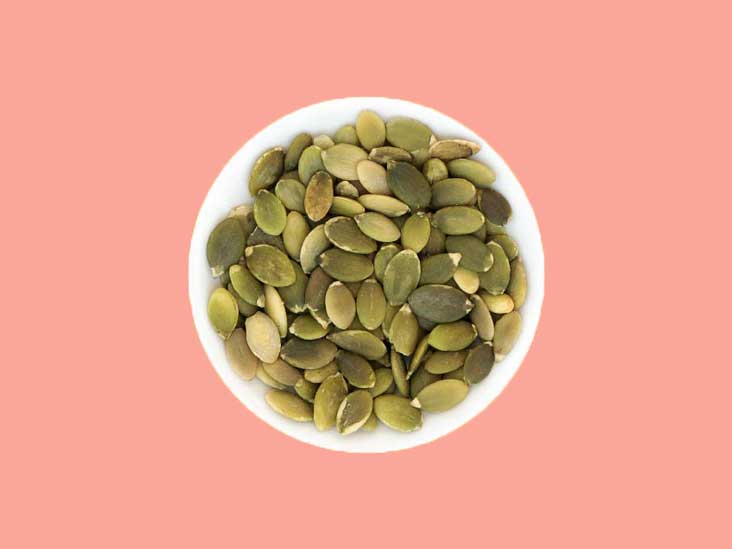
Pumpkin seeds are seeds obtained from the middle portion of a pumpkin. People who are on a restrictive diet eat pumpkin seeds as a snack. It is also used to make various savory dishes due to its rich taste. Pumpkin seeds are nutritional powerhouses wrapped in a small package. They help maintain our health in a variety of ways.
Read on to know more about the health benefits of pumpkin seeds.
Pumpkin seeds also known as “pepita”, are edible seeds present in pumpkins. This word is also used to refer to seeds obtained from various cultivated varieties of squash. Pumpkin seeds normally refer to either the hulled kernel or unshelled whole seed, but most commonly refer to roasted pumpkin seeds.
Did You Know?
– Pumpkin seeds were traditionally used as an anti-parasitic drug by North American people to treat intestinal parasites.
– The pumpkin seed oil has a low smoke point and will turn bitter if heated.
– Pumpkin spice actually doesn’t contain any pumpkin.
Around 7,000 B.C., pumpkin seeds were discovered by archaeologists in the caves of Mexico. Pumpkin and its seeds are an indigenous species of America and are widely found in North America, South America, and Central America. Pumpkin seeds were used popularly among Native American tribes, who treasured them for their dietary and medicinal benefits. They mostly used pumpkin seeds for curative purposes. The Spanish people brought pumpkins to Europe, India, and the rest of Asia, where pumpkin and its seeds were accepted largely as a nutritious and economical food.

Health Benefits of Pumpkin Seeds
The crunchy, delicious pumpkin seeds are a rich source of omega-3 fatty acids in the plant form known as Alpha-Linolenic Acid (ALA), which helps maintain insulin levels in diabetic patients and aids in preventing heart disease. Magnesium present in pumpkin seeds plays a vital role in the body by helping in the proper secretion of insulin, reducing heart risks, building strong bones, and controlling blood pressure.
They also contain tryptophan, an amino acid that helps cure insomnia. Pumpkin seeds contain zinc, which helps in maintaining immunity and prevents uterine infections in pregnant women. Additionally, they help in the conversion of tryptophan.
The pumpkin seed oil contains antioxidants like vitamin E, which helps maintain the skin, and dietary fiber that improves digestive health. Pumpkin seeds also contain omega-3 and omega-6 fatty acids, which reduce the risk of cardiac arrest, and lignans, which have anti-cancer properties.
Major Health Benefits of Pumpkin Seeds
Improves Heart Health
Pumpkin seeds contain nearly half of the recommended daily allowance (RDA) of magnesium. Magnesium can help prevent various heart diseases. It maintains blood pressure, which reduces the risk of cardiac arrest and stroke. Pumpkin seeds are also a rich source of zinc, antioxidants, and omega-3 fatty acids (alpha-linolenic acid), which help improve heart health.
Additionally, pumpkin seed oil contains nitric oxide, which helps to expand blood vessels, improve blood flow, and reduce the risk of plaque formation in the arteries.

Manages Diabetes
Recent studies on diabetic animals showed that ground pumpkin seeds, pumpkin seed extracts, and pumpkin seed oil improve insulin regulation in diabetic animals. They also prevent the effects of diabetes on kidney function by decreasing oxidative stress.

Several studies show that supplementing the diet with pumpkin juice or pumpkin seed powder reduces blood sugar levels in people with type 2 diabetes. Omega 3-fatty acid (alpha-linolenic acid) present in pumpkin seeds is also known for maintaining insulin levels in diabetic patients.
Cures Insomnia
Pumpkin seeds help treat insomnia as they are a rich source of tryptophan. Tryptophan, with the help of zinc, converts to serotonin (the relaxing hormone), which in turn converts to melatonin, also known as the “sleep hormone." Additionally, the magnesium present in pumpkin seeds can help you sleep better when consumed in adequate amounts.
Know about how you can sleep better at night here!
Reduces Depression and Anxiety
Pumpkin seeds help in managing anxiety and depression due to the formation of 5-hydroxytryptophan (5-HTP) in the body from tryptophan.

According to the University of Maryland Medical Center, 5-HTP can have a positive effect on sleep, anxiety, mood, appetite, and pain. 5-HTP can be an effective treatment as it increases serotonin levels in the brain, contributing to your well-being and happiness.
Improves Bone Health
Pumpkin seeds are exceptionally high in magnesium, which is important for bone formation. A high magnesium intake improves bone density and decreases the risk of osteoporosis in postmenopausal women. Osteoporosis is a condition in which the bones become weak and brittle.

Improves Prostate Health
Pumpkin seeds are good for overcoming the symptoms of an enlarged prostate due to the presence of zinc. Zinc helps to maintain testosterone levels in men, which keeps the prostate healthy and prevents the occurrence of prostate cancer. Zinc also ensures high fertility in men by boosting sperm quality.

Know all about prostate health here!
How to Eat Pumpkin Seeds?
In India, people add pumpkin seeds to vegetable curries for their rich taste. Pumpkin seed oil has its place in Ayurvedic medicine due to its therapeutic properties that help prevent arthritis and kidney problems.
People who are strictly vegetarians can eat roasted pumpkin seeds as an additional source of protein in their diets. You can also use pumpkin seed oil for massaging inflamed areas of the skin for quick relief. Masala roasted pumpkin seeds are a great snack during afternoon tea time.

Other ways to eat pumpkin seeds are:
- Bake the pumpkin seeds with a dash of olive oil and season them with cumin and garlic powder. This healthy and delicious snack will drive away those untimely hunger pangs and keep the stomach full.
- You can also use pumpkin seeds to make pumpkin seed butter by blending the whole seeds in a blender until it forms a smooth paste. Add it to toasted multi-grain bread for breakfast. It will not only keep your hunger under control but will also provide energy to the body.
- Roasted pumpkin seeds are also a great addition to salads and soups for a lovely taste, especially for diabetic patients.
Disclaimer: Pumpkin seeds have a tough and chewy outer cover, which may cause indigestion. Therefore, it is always advisable to avoid overeating these seeds as they contain excess fiber. Excess pumpkin seeds also irritate the stomach and cause the formation of intestinal gas. Unsaturated fatty acids present in pumpkin seeds are prone to spoilage, which makes these seeds rancid. Eating rancid pumpkin seeds leads to health risks like cancer, heart disease, and other chronic illnesses.
Nutritional Information
100g of Pumpkin seeds provide 446 calories.
Carbohydrate – 54g (Dietary Fiber – 18g, Sugar – 0g), Protein – 19g, Fat – 19g (Saturated fat-3.7g, PUFA-9g, MUFA – 6g), Sodium – 18mg, Potassium – 919mg
And percentage daily value of Vitamin A – 1%, Iron – 18%, Magnesium – 65%, Calcium – 5% (based on a 2,000-calorie diet).



.png)


